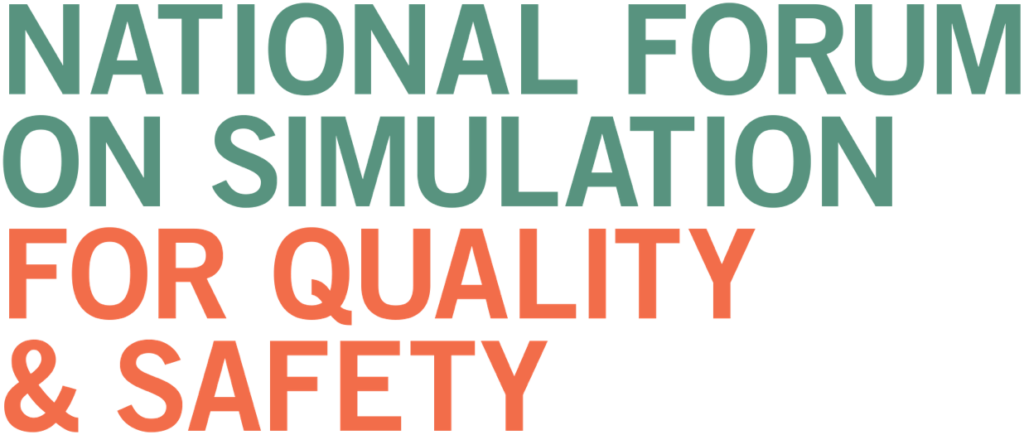
The Forum is a truly unique event that highlights applications of simulation, and evidence for its effectiveness, to advance patient safety and quality improvement efforts.
Simulation is revolutionizing approaches to patient safety and quality improvement in healthcare. It is contributing to meaningful improvements in care quality metrics, patient outcomes, safety culture, cost effectiveness, and adverse events.
The National Forum will not be returning this year – please stay tuned for 2024!
Below are the details from the cancelled 2020 National Forum due to the pandemic.
2020 Theme
‘Seas’ the Day! Collaborations to transform Health Systems
The primary audience for this conference is healthcare agency leadership and patient safety or quality improvement officers who wish to better understand how simulation-based approaches are meaningfully improving organizational reliability, culture, safety and care quality.
Conference Scope
At the Forum, we specifically focus on applications of simulation to achieve quality and patient safety (rather than educational) goals. Examples include:
- simulations to address a known safety or quality gap
- further examining suspected safety/quality gaps with simulations
- supplementing root cause analyses
- simulations to test new processes or procedures for latent errors
- improving safety culture / just culture
- human factors analyses
- simulations during the design and building of clinical spaces
- on-boarding new staff or improving staff retention
- simulation as part of the hiring process
- simulation for patients, families and caregivers
- evaluating options for medical device procurement
- just-in-time training
- rapid skills refreshers for low-frequency high-acuity events
- in-situ simulations
- learning hospital layout
Program
We are currently confirming presenters. Details will be added as presenters are confirmed!
Since this is a leading-edge and rapidly evolving area of innovation, the Forum is structured to include as much time to network, discuss, ask questions, and learn from other participants as possible.
The conference will include:
- A keynote speaker to inspire and motivate.
- Presentations from 15-20 innovators using simulation in creative and impactful ways to improve the healthcare system, processes, spaces and culture.
- Extensive networking time for participants to connect with and learn more from presenters.
- Workshops for a deep dive into key aspects of system-level simulations.
- Tours of local simulation facilities.
Keynote Speakers
We are excited to announce this year’s keynote from two inspirational change agents and patient advocates from Nova Scotia!
Re-Conceptualizing System Improvement
Inclusivity is a foundational tenet of a safe and effective healthcare system. Simulation offers an opportunity to consider assumptions and biases, to truly learn through the experiences of others. What is the impact of beginning with inclusion?

JK Health Equity Consultants;
PhD Student, Dalhousie University School of Nursing;
Psychiatric Nurse, Nova Scotia Health Authority

JK Health Equity Consultants;
Acting Operations Supervisor, Nova Scotia Emergency Health Services
Jennifer and Krista advocate diversity and inclusion to be key factors in equitable engagement, culturally safe care and systems change that benefit individuals, groups, and organizations alike. They deliver simulation-based education through an 2SLGBTQ (Two Spirit, lesbian, gay, bisexual, transgender, and queer) lens to bring about diverse and applied understandings of equity in a variety of professional settings.
More >
Innovation & Impact Presentations
These national leaders will share a brief overview of their work with simulation and its impact on care quality and patient safety. Afterwards, there is time for delegates to meet and discuss initiatives with presenters. Confirmed presentations are listed below (more to follow!):
| When the Root Cause Analysis solution misses the mark – How simulation can help | Doug Sinclair; IWK Health Centre, NS |
| Get in the Game! Using Clinical Simulation Virtual Games to Educate Interprofessional Healthcare Teams on Patient Safety Initiatives: Medical Device Incident | Danielle Byrne, Kelly Lackie & Shelley L. Cobbett; Dalhousie University, NS |
| Crash Testing the Dummy: In Situ Trauma Simulation at the QEII Hospital | Samuel Jessula, Robert Green & Samuel Minor; Dalhousie University, NS |
| Code White! Assessing the hospital’s response to aggression through in-situ simulation | Glenn D. Posner; The Ottawa Hospital & University of Ottawa, ON |
| In Situ Pediatric Mock Codes: Improving simulation delivery to improve team and system performance | Jennifer Foster; Dalhousie University & IWK Health Centre, NS |
| Improving Patient Safety by Enhancing Team Work and Communication Knowledge and Skills Using the ‘TeamSTEPPS CanadaTM Essentials’ Online Open Access Microlearning Course | Gina De Souza & Maureen Sullivan-Bentz; CPSI, ON |
| Using Simulation During the Design and Redevelopment of NICU and PICU | Barb Ellesmere & Tanya Bishop; IWK Health Centre, NS |
| Interprofessional Massive Transfusion Protocol Simulation: Lessons Learned | Maxine Bernard & Narendra Vakharia; IWK Health Centre, NS |
Workshops
Simming outside the box: Considerations for Interagency Simulations
Glenn D. Posner, The Ottawa Hospital Simulation Patient Safety Program & the University of Ottawa Skills & Simulation Centre
Simulation in the clinical environment has its own set of challenges, but when your simulation extends beyond your own institution, there are a host of other considerations that come into play. This workshop will present a recent simulation involving a midwifery birthing centre, paramedics, and a tertiary hospital. Using this example as a springboard, participants will practice crafting their own interagency events, demonstrating an appreciation for the stakeholder engagement required for success.
Objectives: By the end of the session, the participant will be able to:
- Utilize in-situ simulation to identify latent safety threats in the clinical environment
- Design a simulation scenario that involves two or more healthcare units
- Brainstorm around the stakeholder engagement required when planning an interagency simulation
Building your lighthouse: Creating and delivering psychologically safe interprofessional simulations
Kathryn Hayward, Noel Pendergast, Sarah Campbell Bligh, Doug Ferkol; Dalhousie University
Interprofessional collaboration (IPC) leads to improved quality of care, patient safety and ultimately better patient outcomes. Practicing IPC in a simulated environment creates a safe learning opportunity to develop essential skills required in today’s complex healthcare system. This workshop will support participants understanding of key considerations for creating and delivering psychologically safe interprofessional (IP) simulation, through a mix of experience sharing, didactic, and activities.
Objectives: By the end of the session, the participant will be able to:
- Understand considerations for setting the foundation for a successful and safe IP Simulation.
- Discuss key components of developing and delivering an IP Simulation that promotes psychological safety while emphasizing IP competencies.
- Review important aspects for creating a psychologically safe IP simulation debrief.
- Develop awareness of challenges and barriers to the creation and delivery of psychologically safe IP simulations.
Sponsors & Exhibitors
This is a unique and affordable event to connect with patient safety and quality improvement leaders! A limited number of exhibit tables is available. To sponsor or exhibit at the National Forum, please follow to our prospectus here to complete the application.
- HIROC
- CPSI
- HSO
- Gaumard Scientific
- Nasco Healthcare